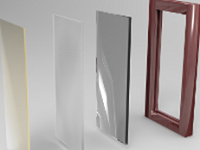Window Thermal Barrier

Technology Description:
Palo Alto Research Center (PARC) and its partners are developing a low-cost, transparent thermal barrier, consisting of a polymer aerogel, to improve insulation in single-pane windows. The proposed high-performance thermal barrier is anticipated to achieve ultra-low thermal conductivity, while offering mechanical robustness and the visual appearance of clear glass. Additionally, the thermal barrier’s synthesis is scalable and thus amenable to high volume manufacturing. The envisioned replacement windowpane is a tri-layer stack consisting of the aerogel, glass, and a low-emissivity coating – an architecture designed to improve the window’s energy efficiency, condensation resistance, user comfort, and soundproofing. In this project, PARC will optimize the transparent polymer aerogel synthesis process; Blueshift will scale up fabrication to a 12-inch roll-to-roll pilot process; and Pilkington will evaluate the windowpane performance and durability. At the completion of the project, the aerogel will be integrated in a 12” x 12” windowpane prototype with commercial-off-the-shelf float glass, adhesives, and coatings. The final product will be a windowpane of similar weight and thickness to existing single panes. Based on current raw material and manufacturing costs, PARC foresees that this integrated windowpane can be manufactured at a low cost of $9/ft2.
Potential Impact:
If successful, PARC’s project will enable energy-efficient retrofits for the substantial remaining stock of single-pane windows in the United States. Retrofitting single-pane windows could produce significant environmental and economic benefits. By consuming less electricity, natural gas, and/or heating oil to warm a building, these technologies could help avoid greenhouse gas emissions associated with these energy sources. Moreover, these technologies could help reduce building energy consumption and save money for homeowners and businesses. Consumers adopting these retrofits could also benefit from improved window performance, including greater comfort and reduced condensation in cold weather and improved soundproofing.
Contact
ARPA-E Program Director:
Dr. Marina Sofos
Project Contact:
Dr. Mahati Chintapalli
Press and General Inquiries Email:
ARPA-E-Comms@hq.doe.gov
Project Contact Email:
Mahati.Chintapalli@parc.com
Partners
Cardinal Glass Industries
Blueshift International Materials, Inc.
Pilkington North America, NSG Group
Related Projects
Release Date:
10/07/2015
